
Pharmaceuticals
Scope & Guideline
Leading the Charge in Open Access Pharmaceutical Research
Introduction
Aims and Scopes
- Drug Discovery and Development:
Focuses on the identification and optimization of new drug candidates, including small molecules, biologics, and natural products. This area includes research on the mechanisms of action, structure-activity relationships, and the use of computational methods for drug design. - Pharmacokinetics and Pharmacodynamics:
Investigates the absorption, distribution, metabolism, and excretion of drugs, along with their biological effects. This includes studies on drug interactions, bioavailability, and the influence of genetic and environmental factors on drug response. - Formulation Science:
Explores novel drug formulations, including nanoparticles, liposomes, and other delivery systems aimed at enhancing therapeutic efficacy and minimizing side effects. This area emphasizes the development of smart drug delivery systems, including those utilizing nanotechnology. - Clinical and Translational Research:
Encompasses studies that bridge laboratory findings with clinical applications, focusing on the effectiveness and safety of therapies in real-world settings. This includes pharmacovigilance, real-world evidence, and patient-centered outcomes. - Natural Products and Traditional Medicine:
Examines the pharmacological properties of compounds derived from natural sources, including herbs and other botanicals. Research in this area often includes ethnopharmacological approaches and the integration of traditional medicine with modern therapeutic practices. - Innovative Technologies in Drug Delivery:
Covers advancements in the technologies used for drug delivery, such as microfluidics, 3D printing, and nanotechnology. This scope also includes the use of artificial intelligence and machine learning in drug discovery and development.
Trending and Emerging
- Artificial Intelligence and Machine Learning in Drug Discovery:
Increasingly, researchers are employing AI and machine learning techniques to streamline drug discovery processes, optimize formulations, and predict drug interactions, indicating a significant trend towards computational approaches. - Focus on Personalized Medicine:
There is a growing emphasis on personalized medicine, with research aimed at tailoring therapies based on individual genetic, metabolic, and phenotypic profiles, reflecting a shift towards more patient-centered approaches. - Integrative Approaches to Therapy:
The integration of natural products with modern pharmaceutical agents is gaining traction, leading to the development of hybrid therapies that combine the strengths of both traditional and contemporary medicine. - Targeted Drug Delivery Systems:
Advancements in nanotechnology and biomaterials are driving research into targeted delivery systems that improve the efficacy and safety of drugs, particularly in oncology and chronic diseases. - Pharmacogenomics and Precision Pharmacotherapy:
Research is increasingly focusing on pharmacogenomic factors influencing drug response, aiming to optimize treatment regimens based on genetic predispositions and variations.
Declining or Waning
- Conventional Drug Formulations:
Research focusing solely on traditional oral formulations without innovative delivery systems is decreasing, as the field shifts towards more complex and effective delivery mechanisms. - Pharmacological Studies on Established Drugs:
There is a noticeable reduction in studies centered on the pharmacology of well-established drugs, as the focus has shifted towards novel therapies and drug repurposing strategies. - Basic Mechanistic Studies:
Research that primarily investigates basic mechanistic pathways without translational implications is becoming less prominent, with a growing emphasis on studies that connect laboratory findings to clinical applications. - Single-Target Drug Development:
The trend is moving away from the traditional 'one drug, one target' paradigm towards multi-target approaches and combination therapies, reflecting a broader understanding of disease complexity.
Similar Journals

Pharmaceutical Sciences
Bridging research and practice to transform healthcare.Pharmaceutical Sciences, an esteemed journal published by Tabriz University of Medical Sciences, Faculty of Pharmacy, serves as a crucial platform for the dissemination of pioneering research in the fields of pharmaceutical science, pharmacology, and toxicology. With an impact factor reflective of its substantial contribution to the scientific community, this open access journal has been accessible since 2012, ensuring that researchers, professionals, and students worldwide can engage with its rich content. Located in Iran, it has continually evolved, covering research from 2009 to 2024, and boasts impressive rankings in multiple Scopus categories, including Q3 in Pharmaceutical Science and Q2 in Pharmacology, Toxicology and Pharmaceutics. By bridging gaps between scientific inquiry and practical applications, Pharmaceutical Sciences is dedicated to advancing pharmaceutical knowledge and promoting innovative practices that address significant health challenges.

Acta Pharmaceutica Sinica B
Pioneering Innovations in Drug DevelopmentActa Pharmaceutica Sinica B is a prestigious open access journal that has been setting the standard in the field of pharmacology, toxicology, and pharmaceutics since its establishment in 2011. Published by the Institute of Materia Medica, Chinese Academy of Medical Sciences, the journal serves as a vital platform for researchers, professionals, and students seeking to disseminate innovative findings in drug development, pharmaceutical sciences, and therapeutic applications. With an impressive impact factor reflecting its high academic quality, Acta Pharmaceutica Sinica B has achieved Q1 status in the category of Pharmacology, Toxicology and Pharmaceutics as of 2023, ranking #1 out of 80 journals in General Pharmacology. This journal not only focuses on the latest advancements in drug research and formulation but also emphasizes interdisciplinary approaches, fostering collaborations that span various scientific domains. The accessible nature of the journal, combined with its rigorous peer-review process, ensures that crucial insights and breakthroughs reach a global audience swiftly and effectively. For those looking to stay at the forefront of pharmaceutical research, Acta Pharmaceutica Sinica B is an indispensable resource.
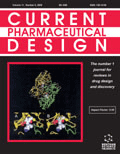
CURRENT PHARMACEUTICAL DESIGN
Exploring Breakthroughs in Pharmacology and Drug DesignCURRENT PHARMACEUTICAL DESIGN is a leading journal in the fields of Drug Discovery and Pharmacology, published by Bentham Science Publishers Ltd in the dynamic United Arab Emirates. With an impressive historical span from 1995 to 2024, this journal serves as a vital platform for disseminating innovative research findings, breakthrough methodologies, and critical reviews that shape the future of pharmaceutical sciences. Ranked Q2 in both Drug Discovery and Pharmacology categories according to the 2023 metrics, it places itself within the top-tier percentile, catering to a diverse audience of researchers, industry professionals, and students. The journal’s commitment to high-quality research exploration is evidenced by its Scopus ranking, where it is positioned favorably within its category ranks. Although currently not Open Access, CURRENT PHARMACEUTICAL DESIGN remains an essential resource for those looking to stay at the forefront of pharmacological advancements and drug development strategies.

Journal of Pharmaceutical Investigation
Uncovering breakthroughs in pharmacology and toxicology.Journal of Pharmaceutical Investigation, published by SPRINGERNATURE, is a leading academic resource in the field of pharmaceutical sciences, offering critical insights and innovative research findings. With an impact factor that underscores its significance, this journal ranks in the Q1 category for both Pharmacology and Pharmaceutical Science as of 2023, showcasing its high-quality publications and rigorous peer-review processes. Operating from the Netherlands, the journal spans from 2012 to 2024, offering a rich archive of interdisciplinary research contributions that advance knowledge in pharmacology, toxicology, and pharmaceutics. It holds impressive Scopus rankings, placing it among the top-tier journals in its categories, which enhances its appeal to researchers, professionals, and students aiming to publish their work or stay up-to-date with the latest advancements in the pharmaceutical field. Engaging with the Journal of Pharmaceutical Investigation not only enriches your understanding but also connects you with a community dedicated to advancing healthcare and therapeutic innovations.
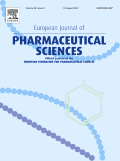
EUROPEAN JOURNAL OF PHARMACEUTICAL SCIENCES
Empowering Researchers to Transform Pharmaceutical PracticesThe European Journal of Pharmaceutical Sciences is a prestigious academic journal dedicated to advancing the field of pharmaceutical science. Published by Elsevier, the journal boasts an impressive impact factor and is categorized in the Q1 quartile for pharmaceutical science as of 2023, signifying its influence and reputation within the academic community. With a Scopus ranking of #20 out of 183 in the fields of pharmacology, toxicology, and pharmaceutics, the journal provides a vital platform for researchers and practitioners to disseminate innovative studies and groundbreaking research that push the boundaries of drug development and delivery. Based in the Netherlands and operating since 1993, the journal seeks to cover a broad scope of topics related to pharmaceutical sciences, encouraging rigorous evaluations and discussions that enhance the understanding and application of this critical field. The absence of open access underscores the commitment to maintaining high scholarly standards, while still offering avenues for libraries and institutions to provide access to cutting-edge research. As the journal converges towards its 2024 milestones, it continuously aims to foster a vibrant exchange of knowledge among its diverse readership, comprising committed researchers, professionals, and students.
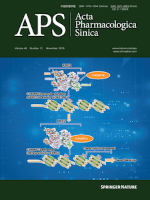
ACTA PHARMACOLOGICA SINICA
Elevating Research in Pharmacological SciencesACTA PHARMACOLOGICA SINICA is a premier journal in the field of pharmacology, published by the esteemed Nature Publishing Group. With a strong history since its inception in 1980, this journal is recognized for its impactful contributions to the fields of medicine and pharmacology, consistently securing a Q1 ranking in multiple relevant categories, including Pharmacology (Medical). Drawing on a robust international readership, it ranks impressively at #8 out of 272 in the specialty of Medical Pharmacology, placing it in the top 97th percentile according to Scopus data. Although currently not an open-access publication, ACTA PHARMACOLOGICA SINICA remains a vital resource for researchers, professionals, and students seeking to advance their understanding of pharmacological sciences. Its commitment to disseminating high-quality research underscores its significance in fostering innovation and exploration in the medical landscape.

RSC Medicinal Chemistry
Catalyzing Change in Drug Discovery and DevelopmentRSC Medicinal Chemistry is a pivotal journal in the realm of medicinal chemistry, published by the esteemed Royal Society of Chemistry. With a focus on innovative research that intersects various disciplines such as biochemistry, drug discovery, pharmaceutical science, and organic chemistry, this journal serves as a vital resource for researchers, professionals, and students alike. Its impressive impact factor and notable rankings—positioning it within the Q1 and Q2 quartiles across critical categories—underscore its significance in advancing knowledge and fostering collaboration within the scientific community. RSC Medicinal Chemistry is dedicated to open access, ensuring that cutting-edge findings on drug design and therapeutic applications are freely available to enhance global research efforts. With a commitment to publication excellence from 2020 to 2024, it is a prominent platform where groundbreaking ideas meet practical implications, making it indispensable for anyone committed to the forefront of medicinal advances.
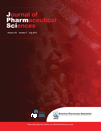
JOURNAL OF PHARMACEUTICAL SCIENCES
Advancing pharmaceutical knowledge, shaping future innovations.The JOURNAL OF PHARMACEUTICAL SCIENCES, published by ELSEVIER SCIENCE INC, stands as a cornerstone in the field of pharmaceutical sciences, offering a platform for innovative research and advancements since its inception in 1961. With an impressive Scopus Rank of #36 out of 183 in the Pharmaceutical Science category, this journal is recognized for its commitment to disseminating high-quality, peer-reviewed studies that significantly contribute to the realms of pharmacology, toxicology, and pharmaceutics. Holding a 2023 Q2 category quartile, it attracts a diverse readership encompassing researchers, industry professionals, and students eager to advance their understanding and expertise. While the journal is not open access, it ensures valuable insights in every issue, making it an essential resource for those dedicated to the evolving landscape of pharmaceutical research. With an impact factor that reflects its relevance and influence, the JOURNAL OF PHARMACEUTICAL SCIENCES continues to shape the discourse in its domain, fostering innovation and collaboration among scholars worldwide.

JOURNAL OF PHARMACY AND PHARMACOLOGY
Fostering collaboration in the realm of drug discovery.Journal of Pharmacy and Pharmacology, published by Oxford University Press, is a prestigious academic journal dedicated to the advancement of knowledge in the fields of pharmaceutical sciences and pharmacology. With a strong heritage dating back to 1949, this journal maintains a robust influence, as evidenced by its ranking in the second quartile (Q2) across both Pharmaceutical Science and Pharmacology categories for 2023. The journal is accessible without an open access option, ensuring traditional academic engagement and providing valuable insights for researchers and professionals. It boasts an impressive Scopus ranking, with a percentile positioning of 72nd in Pharmaceutical Science and 67th in Pharmacology. Aimed at fostering innovative research and facilitating the exchange of cutting-edge scientific knowledge, the Journal of Pharmacy and Pharmacology serves as an essential resource for scientists, students, and healthcare professionals committed to enhancing therapeutic outcomes and advancing pharmaceutical innovations.
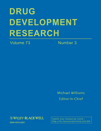
DRUG DEVELOPMENT RESEARCH
Exploring the frontiers of drug discovery and development.DRUG DEVELOPMENT RESEARCH is a premier interdisciplinary journal published by Wiley, focusing on the latest advancements in drug discovery, pharmacology, and toxicology. With an ISSN of 0272-4391 and an E-ISSN of 1098-2299, this esteemed publication has been a cornerstone in the field since its inception in 1981 and continues to provide cutting-edge research until 2024. Its rigorous peer-review process and strategic placement in Q2 of the Drug Discovery category, as well as ranking #60 out of 157 in Scopus, underscore the journal's relevance and influence, boasting a respectable 62nd percentile ranking. While the journal does not currently offer open access, it remains a vital resource for researchers, professionals, and students seeking to expand their knowledge on the processes of drug development, identifying new therapeutic targets, and assessing the efficacy and safety of novel compounds. Situated in Hoboken, NJ, this journal stands at the forefront of pharmaceutical innovation, making significant contributions to the advancement of medical science.